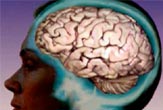Is Cancer the Price for Our Big Brains?

Our large brains may make us cognitively superior to chimps, but, according to a new hypothesis, we could be paying a price for our sizable cerebrum: a higher rate of cancer. Chimpanzees are thought to be the closest evolutionary relative to humans, and we share around 98 percent of our genes with these primates. But for years, scientists have observed that chimps have a surprisingly low cancer rate compared to humans. To find out why this might be, John McDonald, a researcher at Georgia Tech, turned to the human and chimp genome. Many past studies have looked at differences in how genes are expressed among humans and chimps. McDonald and his colleagues re-examined the data of a previous gene expression study and added some previously excluded information. They looked for differences in gene expression in several tissues, including the brain, liver, testes and kidneys. Self-destroying cells McDonald wanted to test a hypothesis that the difference in cancer rates between the species could be due to differences in the way their cells self-destroy themselves — an important biological process known as programmed cell death or apoptosis. The researchers saw that some of the genes for apoptosis were expressed differently in humans than in chimps, and their data suggests that human cells are not as efficient at carrying out programmed cell death as chimp cells, at least in the brain and other studied tissues. What does apoptosis have to do with cancer? Reduced amounts of apoptosis have been associated with an increased risk of cancer. Also, several genes involved in apoptosis are thought to "malfunction" in cancer cells. This makes sense: cancer cells divide uncontrollably and somehow seem to override the signal to self-destruct. Paying the price And what does that have to do with a large brain? During human evolution, it is thought that people were naturally selected for larger brains and increased cognition. There is also another hypothesis that to get these larger brains, we needed to have a high rate of neuron synthesis. The researchers are tying these two hypotheses together. They think that reduced apoptosis may have helped people acquire their large brains. But it may also have made us more prone to cancer. "It's kind of hard to explain why we could have evolved to have a less efficient apoptotic system," says McDonald. "So the hypothesis we came up with was that maybe selection to increase brain size was what put the selective pressure on the system to reduce apoptosis." And even though less apoptosis may have meant more cancer, there would not have been selective evolutionary pressure against it since most cancers don't appear until after reproductive age, McDonald adds. The hypothesis is slightly different from many previous ideas about how we evolved large brains. "We have larger brains than chimps, [and] most people have focused on the fact that we may be producing neurons at a higher rate," McDonald told LiveScience. "But I think the other side of the story is that we could also not be destroying them." The research was also supported by recent studies that observed that people with certain cognitive diseases — diseases that are associated with an increase in neuron apoptosis — have lower cancer rates. More research needed So far, the published evidence is only from gene expression patterns. Additional studies are being carried out to look at the actual rate of cell death in chimps and humans. And even with a lot more evidence, no one can ever know for sure why we evolved to be a certain way. "It's a hypothesis, so the question is whether it's true or not," says Stephen Hubbell, a professor of evolutionary biology at UCLA, who was not involved in this study. "It would be really interesting if … selection on humans relative to chimps might have changed the expression of these genes and affected the likelihood of getting sick." "I thought this really could galvanize some really interesting research in directions where evolutionary biology is brought to bear on medical questions," he added. The results were published online in May in the journal Medical Hypotheses.
- Video: Scientists Expand Chimps Minds
- Top 10 Mysteries of the Mind
- Why Are Humans Always So Sick
Sign up for the Live Science daily newsletter now
Get the world’s most fascinating discoveries delivered straight to your inbox.

Rachael is a Live Science contributor, and was a former channel editor and senior writer for Live Science between 2010 and 2022. She has a master's degree in journalism from New York University's Science, Health and Environmental Reporting Program. She also holds a B.S. in molecular biology and an M.S. in biology from the University of California, San Diego. Her work has appeared in Scienceline, The Washington Post and Scientific American.









